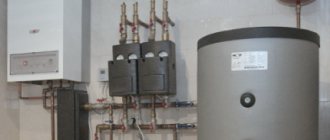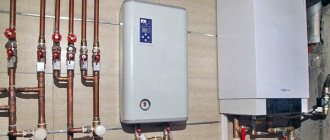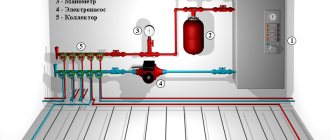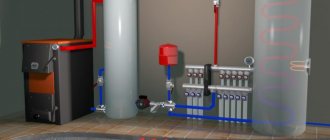What is more profitable to operate: gas or electricity?
It is impossible to accurately calculate the consumption of gas or electricity, since the system often does not work at full capacity, ensuring the desired temperature in the house. Accordingly, it depends on several conditions, for example, on the quality of the insulating material, the thickness of the walls, as well as the specified temperature parameters. If we roughly compare the costs of heating a room, we get the following picture:
- When operating a standard electric boiler and boiler at half power, the energy consumption will be approximately 6 kW/h. Considering the average cost of electricity per 1 kW is 2.34 rubles, the heating fee will be about 10,100 rubles per month.
- When a double-circuit gas boiler is operating at half power, the gas consumption will be 1.15 m³/h. If 1 m³ of gas costs 4.5 rubles, then the fee for using the system will be about 3,770 per month.
What is more profitable to heat a house: gas or electricity? Naturally gas, but when choosing this method you should take into account the additional costs of bringing it into the house:
- connection to the gas main;
- drawing up a gas pipeline project;
- acquisition of necessary materials;
- cost of work;
- fire inspector inspection;
- regular equipment maintenance.
Heating a private home with gas is much more economical than with electricity, and the cost of connecting it will pay off within a couple of years. The main thing that should be taken into account is the rules for boiler room equipment, the optimal power of the boiler and proper installation.
Ease of use
The operation of modern boilers, regardless of the type of fuel, is not difficult.
Ease of maintenance and use is an important characteristic. The consumer pays extra for convenience.
Electric boiler
The device is equipped with a control module and multi-stage automatic safety system. The setup is extremely simple and is carried out by the consumer himself. If the device is equipped with a programmer, you can also set the operating mode - for example, reducing power at night, on and off times, etc.
Gas holder
Operating the gas tank itself is also not difficult. The tank operates in automatic mode. The owner periodically checks the fuel level using the sensor and, if necessary, buys a gas mixture. The download is performed by the supplier.
To make the right decision, you need to evaluate all factors. For example, if elderly people live in a private house, electricity is preferable - it is safer. If there are interruptions in the supply of electricity, it is better to install a gas holder.
Advantages and disadvantages of electric heating
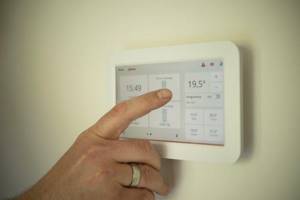
Electric heating, compared to gas heating, is absolutely safe and convenient. There are currently two types of electric heating:
- Water, which requires the installation of a coolant that heats up and supplies heat to the rooms. This type of heating also requires the installation of a boiler, due to which the water in the system will be heated. Water is characterized by a high level of inertia, so this system is very effective.
- Convector heating involves installing a heating radiator in each room. These can be either independent heating devices or a single system interconnected by a common control. Installation of a convector heating system is quite simple: you just need to hang the radiators and provide them with 220 V power.
In any case, heating with electricity at the price of gas is nothing more than a myth. If you close your eyes to the high cost of electricity, you can find many advantages of electric heating:
- ease of installation. You can install a boiler or radiators on your own, without the help of specialists. To carry out electric heating, you will not need a separate room for the boiler room and permission from the inspection authorities;
- installation cost is much lower compared to gas heating. To provide your home with heat, you don’t need to draw up a project, wait for permission to use it to be ready, and so on;
- no need to lay utilities;
- there is no need to build a smoke removal system and install smoke detectors;
- Electric heating is safe and does not pollute the environment;
- The electrical system is easy to operate.
Among the shortcomings we note:
- Low heat transfer efficiency.
- The need for a constant and stable supply of electricity.
- High electricity consumption in cold weather.
Electric heating
You may be interested in: Determination of financial results: accounting procedures, accounting entries
This method involves the use of boilers, which are divided into two types, namely floor-mounted and wall-mounted.
The operating principle is quite simple. The steel tank contains tubular electric heaters that convert electricity into heat. These elements heat the coolant, and then, thanks to the circulation of water, the building is heated.
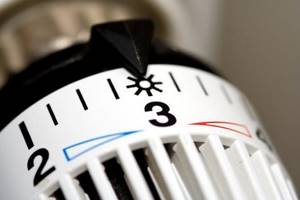
Advantages of gas central heating
Central heating with gas becomes much more economical if the main line is located next to the building. You can also save on connecting to the central system:
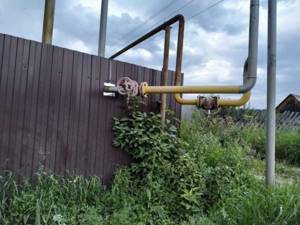
If you contact the same organization regarding the design, installation and enter into a service agreement, the connection will cost less.
It is necessary to pay attention to the location of the boiler. The closer it is installed to the place where gas enters the house, the cheaper its connection will be, and you can choose its power - it must correspond to the size of the heated room. The chimney must be of a suitable size.
Advantages of using liquefied gas
Heating a house with gas from cylinders is a simple and affordable method of organizing gas heating.
Pros:
- ease of installation;
- autonomous operation of the boiler;
- correct equipment settings allow you to minimize fuel consumption;
- no need to connect to the power supply;
- liquefied gas is an environmentally friendly fuel.
Gas holder for a private home
Using a gas holder is the most convenient way to supply a heating system with liquefied gas.
Benefits include:
- no need to regularly fill gas cylinders;
- underground installation does not take up much space;
- On average, refilling a gas tank lasts for one year;
- the volume of the gas tank is sufficient to operate several devices at the same time;
- A gas holder is safer than a gas cylinder.
What is more profitable: gas tank or electricity? At the moment, electricity is considered the most expensive way to heat a home, so using a gas holder, along with natural gas, is more economical.
We recommend: Which is cheaper: gas holder, main gas or pellets
Easy to connect
Connecting electricity couldn't be easier. With one caveat: the local electrical grid must “pull” your heating system. If it doesn’t “pull”, it’s bad; installing another network is as difficult as installing main gas. Then it’s better to immediately take a closer look at gas.
Carrying out autonomous gas is a little more difficult. The installation team will dig a pit 10 meters from the house and install a concrete foundation. A gas holder will be placed on it using a manipulator and the container will be secured with anchors. After filling with soil, only the carpet cover will remain on the surface.
98% of installations are completed within 8 hours. Separately, specialists will connect gas to the heating system in the house. Further, as in the case of electricity, liquefied gas is supplied to the heating element without human intervention.
4
Disadvantages of central gas heating
The following points can be highlighted:
- If the building is not connected to a central heating system, then the costs of the work are so high that not everyone will be able to bear them.
- The gas is highly explosive and can cause significant harm if safety precautions and operating instructions are not followed.
- If the house is rarely used in winter, then installing a gas heating system is not cost-effective, since it takes a very long time to warm up.
Disadvantages of using liquefied gas
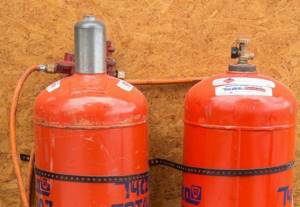
The use of liquefied gas in cylinders is not always convenient because:
- the more powerful the gas equipment, the more cylinders will be needed for its operation;
- empty cylinders must be changed or refilled frequently;
- at sub-zero temperatures, gas is not completely produced;
- cylinders filled with gas are a source of increased danger.
A gas tank has much fewer disadvantages: high cost and the need for excavation work for its installation.
What to choose: heating with bottled gas or electricity? If we are talking about convenience and ease of use, then electric heating comes to the fore here, and if we are talking about savings, then gas is still in the lead, even though it is in cylinders.
Comparing the cost of gas and electricity: which is more profitable?
When choosing a heating method, the first thing homeowners pay attention to is the benefits and only secondarily the ease of use. What is more profitable: gas or electric heating? To answer this question, let's compare prices.
We recommend: How to save money with gas heating and How to supply gas to your dacha
Electric heating cost
We will assume that the room needs to be heated five months a year. Heating an average-sized house will require about 27,000 kW of electricity. Thus, heating a house with electricity will cost about 63,000 rubles, if the cost of electricity per 1 kW is 2.34 rubles.
The cost of heating through a central gas supply system

To heat a house of average size with a gas boiler with a power of 24 kW and a productivity of 2.84 m³/h, you will need 3.548 m³ of gas. This means that the cost of gas heating per year, at a tariff of 4.5 rubles, will be 14,192 rubles.
Cost when using a gas tank
At a price of 17 rubles per liter of liquefied gas, one refill of a gas tank with a volume of 4850 liters will cost 70 thousand rubles. According to statistics, it will cost 459 rubles to heat one square meter per year. This means that for a private house with an area of 80 m2 you will need 36,720 rubles.
Efficiency of gas and electric boilers
Efficiency (Coefficient of Efficiency) is another parameter by which different types of boilers can be compared.
For gas boilers, the efficiency is 88-92% when it comes to classic models. The performance of electric boilers depends on the principle of their operation, but most often their efficiency is 100%.
Which boiler is more convenient and easier to use?
Only the most expensive models of gas boilers are equipped with an automated configuration system. The higher the cost of a gas boiler, the simpler the system for adjusting it. For trouble-free operation of gas equipment, precise settings are required, and even minor failures can lead to system shutdown.
Electric boiler
Electric boilers are equipped with a fully automatic control system, and safety of use is monitored by built-in sensors, ensured by grounding and installation of a residual current device.
In settlements near which a central gas main is located, it is more advisable to use gas for heating the area. In all other cases, the installation of electrical equipment is considered rational.
This article is advisory and is not a guide to choosing a particular system. Answer to the question: Which is cheaper and more convenient to use: heating with gas or electricity? It is decided on an individual basis.
What is gas measured in?
Natural gas is measured in:
- cubic meters (meter in cube);
- kilojoules (kJ);
- calories (cal).
For gas there is such a thing as specific heat of combustion. It is measured in kilojoules. In different sources, these figures vary from 33,500 to 36,000 kilojoules per cubic meter. What is the reason? Gas, like all other energy carriers, has different energy intensity. It all depends on how it is mined and processed. The specific heat of combustion of gas varies depending on the country in which it is produced, since everywhere it is extracted and processed in different ways.
Also for gas there is such a thing as calorie content. In some countries, gas bills are calculated not in cubic meters, but in calories. Most people associate the word calories with nutrition. But in fact, not only dishes have calories. A calorie is the unit of energy that must be expended to heat one gram of water by one degree at a pressure of one atmosphere. A calorie is a standard unit of energy measurement.
